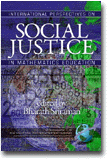
International Perspectives on Social Justice in Mathematics Education
Edited by:
Bharath Sriraman, University of Montana
A volume in the series: The Montana Mathematics Enthusiast. Editor(s): Bharath Sriraman, University of Montana.
Published 2007
International Perspectives and Research on Social Justice in Mathematics Education is the highly acclaimed inaugural monograph of The Montana Mathematics Enthusiast now available through IAP. The book covers prescient social, political and ethical issues for the domain of education in general and mathematics education in particular from the perspectives of critical theory, feminist theory and social justice research. The major themes in the book are (1) relevant mathematics, teaching and learning practices for minority and marginalized students in Australia, Brazil, South Africa, Israel, Palestine, and the United States., (2) closing the achievement gap in the U.K, U.S and Iceland across classes, ethnicities and gender, and (3) the political dimensions of mathematics. The fourteen chapters are written by leading researchers in the international community interested and active in research issues of equity and social justice.
CONTENTS
On the Origins of Social Justice: Darwin, Freire, Marx and Vivekananda, Bharath Sriraman. Home, School, and Community Partnerships in Numeracy Education: An Australian Perspective,
-
Paperback978-1-59311-880-8
Web price: $45.04 (Reg. 52.99)
-
Hardcover978-1-59311-881-5
Web price: $80.74 (Reg. 94.99)
- eBook9781607526148

- MAT030000 - MATHEMATICS: Study & Teaching
- MAT027000 - MATHEMATICS: Research
- EDU000000 - EDUCATION: General
-
 Critique as Uncertainty
Critique as Uncertainty
-
 Crossroads in the History of Mathematics and Mathematics Education
Crossroads in the History of Mathematics and Mathematics Education
-
 Interdisciplinarity for the 21st Century
Proceedings of the 3rd International Symposium on Mathematics and its connections to the Arts and Sciences, Moncton 2009
Interdisciplinarity for the 21st Century
Proceedings of the 3rd International Symposium on Mathematics and its connections to the Arts and Sciences, Moncton 2009
-
 Selected writings from the Journal of the British Columbia Association of Mathematics Teachers
Celebrating 50 years of Vector
Selected writings from the Journal of the British Columbia Association of Mathematics Teachers
Celebrating 50 years of Vector
-
 Selected writings from the Journal of the Mathematics Council of the Alberta Teachers' Association
Celebrating 50 years (1962-2012) of delta-K
Selected writings from the Journal of the Mathematics Council of the Alberta Teachers' Association
Celebrating 50 years (1962-2012) of delta-K
-
 Selected Writings from the Journal of the Saskatchewan Mathematics Teachers' Society
Celebrating 50 years (1961-2011) of Vinculum
Selected Writings from the Journal of the Saskatchewan Mathematics Teachers' Society
Celebrating 50 years (1961-2011) of Vinculum
-
 The Development of Teaching Expertise from an International Perspective
The Development of Teaching Expertise from an International Perspective

